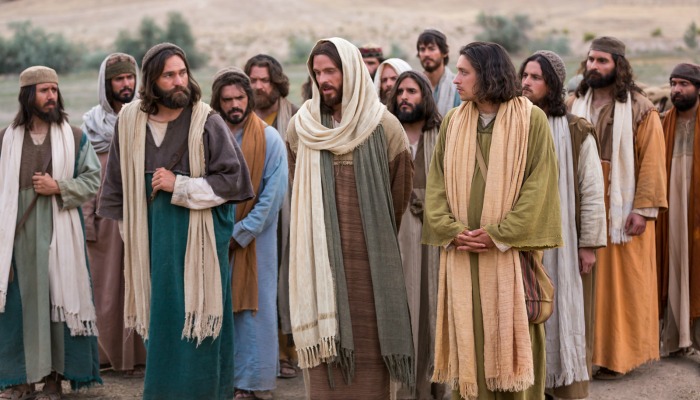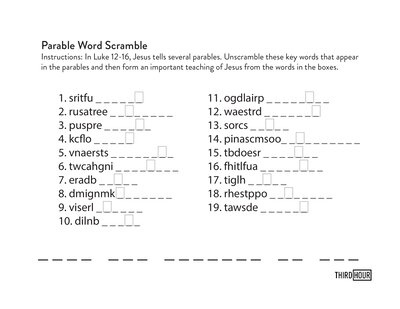“Rejoice with Me; for I Have Found My Sheep Which Was Lost”
The leaven of the Pharisees (Luke 12:1 – 5):
Notice verse 1 which states that a multitude had gathered and that there were so many that they “trode one upon the other.” We don’t know whether the people within the multitude were trying their best to navigate in the crowd or whether they were jostling and competing with one another trying to get to Jesus. It was probably a mixture. We don’t see Jesus trying to address this. He turns to His apostles and speaks with them: “Beware ye of the leaven of the Pharisees, which is hypocrisy.”
Leaven as a symbol is used in two ways in the Bible, as a good thing and a bad thing. As far as the Passover is concerned, leaven represents impurity that needs to be purged. Here Christ specifies hypocrisy as the impurity to beware of. The Pharisees were very observant in keeping the details of both the oral and written law, so they were extremely judgmental not only of those who broke the Law of Moses but anything that was traditional within their subculture. Thus, they passed judgment on others even when the law didn’t.
This added an extra aspect to their hypocrisy. They not only hid their own sins but condemned others for cultural transgressions. This sort of hypocrisy exists in every group and not just religious groups because we are all human. It takes a lot of introspection to detect this kind of hypocrisy in ourselves.
The sin against the Holy Ghost (Luke 12:10):
Christendom is confused about what one has to do to blaspheme against the Holy Ghost. The Benson commentary says, “…If a man’s denying of me rise so high that he blasphemes and reviles the Holy Spirit, and ascribes the miracles wrought by him, in confirmation of the gospel, to the agency of Satan, this sin shall never be forgiven.” The Cambridge Bible Commentary says that blasphemy against the Holy Ghost “…is expressly declared to be closely connected with the attributing of Christ’s miracles to Beelzebub. On the exact nature of the ‘unpardonable sin’ theologians have speculated in vain, and all that we can see is that it must be the most flagrant degree of sin against the fullest light and knowledge.”
Fortunately, we have modern prophets. Joseph Smith said the following:
No man can possibly commit the unpardonable sin in ignorance. A man must be brought to a knowledge of Christ; he must receive a testimony of Christ in his heart, and possess light and power, knowledge and understanding, before he is capable of committing that sin. But when a man turns away from the truth, violates the knowledge that he has received, tramples it under his feet, puts Christ again to open shame, denies His atonement, denies the power of the resurrection, denies the miracles that He has wrought for the salvation of the human family, and says in his heart, “It is not true”, and abides in that denial of the truth, after having received the testimony of the Spirit, he commits the unpardonable sin.
Note the word “knowledge.” Until the Savior actually reveals Himself to us, we are in the realm of faith, not knowledge. We see this transition occur in the story of the Brother of Jared. He had faith, so much that the Savior could not keep him from within the veil. Once the Brother of Jared saw the Christ, he no longer had faith, but knowledge. Because knowledge is required to commit the unpardonable sin, very few people will have committed it.
Do Latter-day Saints believe in a works-based gospel? (Luke 12:47, 48):
Here Christ is talking about people who do the work of Christ, and those who don’t. The servant “knew his lord’s will” so he was a believer, but he was not charitable, but often cruel. The next verse talks about a person ignorant of the gospel who was kind. Which is the most acceptable in the kingdom of God? Confessing the Christ isn’t enough. He expects us to emulate Him.
Forsaking all we have in order to follow Christ (Luke 14:33):
 Christ is saying that we have to be willing to live the Law of Consecration in order to join Him in His kingdom, something which the Rich Young Man would not commit to do. The world can’t have any hold on us for us to be fully committed to Christ. As with any principle, living this law gets easier with practice. It helps to have the faith that God restores what we give up many-fold. The rewards are huge.
Christ is saying that we have to be willing to live the Law of Consecration in order to join Him in His kingdom, something which the Rich Young Man would not commit to do. The world can’t have any hold on us for us to be fully committed to Christ. As with any principle, living this law gets easier with practice. It helps to have the faith that God restores what we give up many-fold. The rewards are huge.
Reclaiming that which is lost (Luke 15):
In several parables, Christ draws pictures of rejoicing in finding that which is precious when it is lost and then found. He emphasizes how precious to God each one of us is. This article discusses how we can help Christ find and reclaim His lost sheep.
No man can serve two masters (Luke 16:13 – 17):
No servant can serve two masters: for either he will hate the one, and love the other; or else he will hold to the one, and despise the other. Ye cannot serve God and mammon.
It’s interesting that Christ was accusing the Pharisees. The Pharisees appeared to be less worldly than the Sadducees, who were richer as a group. The scriptures say they were “covetous.” They seemed to be focused on the law and were hiding that they were of two minds.
And he said unto them, Ye are they which justify yourselves before men; but God knoweth your hearts: for that which is highly esteemed among men is abomination in the sight of God.
So, maybe the Pharisees were not coveting money as much as they coveted prestige. Can “mammon” be anything the world provides that distracts us from God’s work?
Christ then talks about the “law and the prophets.” He is talking about the sections of the Tanakh, which we would call the Old Testament. The Five Books of Moses (Genesis through Deuteronomy) are the Law (Torah). The Prophets (Nevi’im) consists of all the other books except Psalms, Proverbs, Job, Ruth, Lamentations, Ecclesiastes, Esther, Daniel, Ezra, Nehemiah, and Chronicles, which comprise the Writings (Ketubot).
Christ also talks about the pivotal role of John the Baptist in connecting the Aaronic law with the higher law, and He assures the Pharisees that the Law will continue. In the story of the Rich Man and Lazarus, the rich man wants someone from the dead to go back and testify to his family, so they won’t end up in hell as he has. The conclusion of the story is interesting since Christ was talking about the value of the Law of Moses:
And he said unto him, If they hear not Moses and the prophets, neither will they be persuaded, though one rose from the dead.
The righteous in the Book of Mormon were converted to Christ through the Law of Moses until Christ Himself arrived. Christ is saying the Law of Moses was enough for those who sought confirmation through the spirit. Is the Church today “enough” for us?
Lord, increase our faith (Luke 17:5, 6):
And the apostles said unto the Lord, Increase our faith.
And the Lord said, If ye had faith as a grain of mustard seed, ye might say unto this sycamine tree, Be thou plucked up by the root, and be thou planted in the sea; and it should obey you.
A mustard seed is perfectly obedient, just as all the elements and living things are. Some Book of Mormon people did indeed have the faith of a mustard seed:
Wherefore, we search the prophets, and we have many revelations and the spirit of prophecy; and having all these witnesses we obtain a hope, and our faith becometh unshaken, insomuch that we truly can command in the name of Jesus and the very trees obey us, or the mountains, or the waves of the sea.
Jesus abode two days (John 11:6):
Jesus went down to Bethany in Judea even though his apostles objected. When He heard that Lazarus was sick He abode two days in His place before going to Bethany. Christ knew exactly what was happening with His beloved Lazarus. He knew he was sick, and He knew he had died. But He delayed His arrival so He could perform the miracle of raising Lazarus from the dead four days after Lazarus had been interred.
This was Christ’s finale to His many miracles, so impressive that no one in the land could remain on the fence; they were either for Him or against Him after this.
Comfort for Mary and Martha (John 11:19, 20):
And many of the Jews came to Martha and Mary, to comfort them concerning their brother.
Then Martha, as soon as she heard that Jesus was coming, went and met him: but Mary sat still in the house.
This is a reference to the Jewish tradition of “sitting Sheva.” You also see this tradition in the Book of Job. When someone dies, he is quickly buried (by the next day). Then the family sits in the house with the door open and mourns for seven days, with friends and relatives arriving to sit and mourn and reminisce with the family of the deceased. This means true mourning. Jews today don’t prepare food, shave or shower, watch TV, or enjoy the artwork on the walls of their homes. This space set aside for mourning is very healthy, helpful, and admirable.
Caiaphas prophesies (John 11:50):
Caiaphas the wicked High Priest said, “Nor consider that it is expedient for us, that one man should die for the people, and that the whole nation perish not.”
He felt like Christ could destroy the faith of the Jewish nation and it was better for Jesus to die than that the whole nation should lose its faith. Compare this verse to the following from the Book of Mormon.
And it came to pass that the Spirit said unto me again: Slay him, for the Lord hath delivered him into thy hands;
Behold the Lord slayeth the wicked to bring forth his righteous purposes. It is better that one man should perish than that a nation should dwindle and perish in unbelief (1 Nephi 4:12, 13).
Lesson Resources:
churchofjesuschrist.org — Come Follow Me




